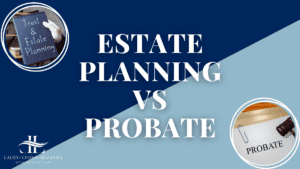 When it comes to managing one’s assets and ensuring a smooth transfer of wealth after one’s passing, the choice between creating an estate plan and being subject to probate becomes crucial. This blog aims to shed light on the key differences between these two options and it explores which one may be more advantageous.
When it comes to managing one’s assets and ensuring a smooth transfer of wealth after one’s passing, the choice between creating an estate plan and being subject to probate becomes crucial. This blog aims to shed light on the key differences between these two options and it explores which one may be more advantageous.
An estate plan, typically crafted with the guidance of a qualified attorney, allows individuals to outline their wishes regarding the distribution of their assets upon their death and allows them to appoint people to manage the administration of those assets. It involves creating legally binding documents such as wills, trusts, and powers of attorney. By planning for the future, individuals can have greater control over how their assets are distributed and minimize potential conflicts among beneficiaries.
On the other hand, probate is the legal process that happens after someone dies with untitled assets or assets with no beneficiary designations. This process involves filing necessary documents with the court, validating the will (if one exists), paying off debts and taxes owed by the decedent’s estate, and distributing remaining assets according to state laws.
While probate can be time-consuming and costly due to court fees and attorney expenses, it does provide a structured framework for asset distribution in cases where there is no valid estate plan in place (known as an intestate estate). Additionally, Florida has specific probate laws that may impact how assets are distributed, such as real estate.

An estate plan offers privacy, flexibility in asset distribution, potential tax benefits through strategic planning, and a streamlined process for loved ones during an already challenging time. Probate, although required in certain situations where no estate plan exists or specific assets are not accounted for, can be burdensome due to its potential costs and delays.
Ultimately, consulting with an attorney who specializes in estate planning is essential when considering an estate plan. They can provide tailored advice based on factors such as asset complexity, family dynamics, tax considerations, and personal preferences.
An effectively crafted estate plan has proven to be a preferred choice for many individuals seeking greater control over their legacy while minimizing potential challenges and costs associated with probate. Contact us know to start the creation of your estate plan.
